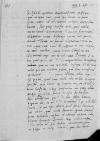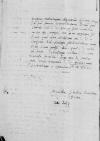Novi equidem, Reverendissime Episcope, quam ineptus sum, quod ego, homo infimae sortis, audeo ad Celsitudinem Vestram meas dare litteras, sed quoque rursus novi, quod multo maius crimen committerem, si diutius praetermitterem Celsitudini Vestrae declarare animi mei gratitudinem. Tanta enim fuerunt Celsitudinis Vestrae merita, quae ante annum ⌊Ratisponae⌋ in me contulit, ut mori mallem, quam videri oblitus vestrae Celsitudinis erga me beneficentiae. Proinde si in hoc quid pecco, id Celsitudo Vestra magnitudini beneficiorum tribuat, quae in me contulit, tribuat. Mihi certe nihil gratius accidere potuit, quam dari occasionem declarandi Celsitudini Vestrae, quam libenter vellem erga Celsitudinem Vestram esse gratus, quod cum nulla alia re hoc tempore fieri potest, in hi<s>(?) litteris ego supplex oro, ut id Celsitudo Vestra boni consulat, sibique persuadeat me quoque idem re ipsa, si oblata fuerit occasio, facturum. Hic adulescens, qui Celsitudini Vestrae has offert litteras, rogavit me, ut eum Celsitudini Vestrae commendarem. Ego autem, etsi sciam id me non decere, tamen fretus humanitate vestra, quam mihi, homini ignoto, ⌊Ratisponae⌋
exhibuit, nolui<t> id officium optimo adulescenti denegare. Proinde rogo vehementer C(elsitudo) V(estra) or C(elsitudinem) V(estram)⌈C(elsitudo) V(estra)C(elsitudo) V(estra) or C(elsitudinem) V(estram)⌉ velit eum sibi habere commendatum, ut possit in studiis litterarum, quas hic brevi
 UUB, H. 154, f. 118v
tempore mediocriter degustavit, feliciter pergere. Sed finem faciam commendationi, primum quod studiosi sunt Celsitudini Vestrae per se satis commendati, ut ego ipse magno meo bono expertus sum, deinde quod idem adulescens est Celsitudini Vestrae a clarissimo domino ⌊Philippo Melanchthone⌋ commendatus, cuius causa novi, quod Celsitudo Vestra nihil non faciet. Felicissime valeat Celsitudo Vestracum universa familia. Ego me et studia mea unice comendo Celsitudinis Vestrae patrocinio.
UUB, H. 154, f. 118v
tempore mediocriter degustavit, feliciter pergere. Sed finem faciam commendationi, primum quod studiosi sunt Celsitudini Vestrae per se satis commendati, ut ego ipse magno meo bono expertus sum, deinde quod idem adulescens est Celsitudini Vestrae a clarissimo domino ⌊Philippo Melanchthone⌋ commendatus, cuius causa novi, quod Celsitudo Vestra nihil non faciet. Felicissime valeat Celsitudo Vestracum universa familia. Ego me et studia mea unice comendo Celsitudinis Vestrae patrocinio.
 UUB, H. 154, f. 118v
tempore mediocriter degustavit, feliciter pergere. Sed finem faciam commendationi, primum quod studiosi sunt Celsitudini Vestrae per se satis commendati, ut ego ipse magno meo bono expertus sum, deinde quod idem adulescens est Celsitudini Vestrae a clarissimo domino
UUB, H. 154, f. 118v
tempore mediocriter degustavit, feliciter pergere. Sed finem faciam commendationi, primum quod studiosi sunt Celsitudini Vestrae per se satis commendati, ut ego ipse magno meo bono expertus sum, deinde quod idem adulescens est Celsitudini Vestrae a clarissimo domino 
